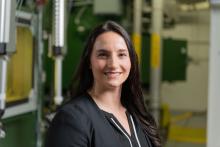Leadership

Brienne Seiner
Project Leader
A radiochemist, Brienne Seiner, is recognized as Pacific Northwest National Laboratory's (PNNL) principal advocate in crafting the Nonproliferation Stewardship Program under the National Nuclear Security Administration’s Office of Defense Nuclear Nonproliferation. This transformative initiative aims to nurture a robust cadre of nuclear nonproliferation experts. Seiner leads the Athena project for the Nonproliferation Stewardship Program, which enables the nationwide competency development for irradiated fuel processing—reinvigorating capabilities that have atrophied after the end of the Cold War. In this leadership role, Seiner collaborates with senior technical teams across the Department of Energy laboratories and maintains constructive dialogs with stakeholders at every tier. Additionally, her position includes effective communication of scientific findings, mentoring emerging talents, and fostering business relationships.
Seiner joined PNNL right after earning her PhD in chemistry from the University of Missouri - Columbia. Her notable contributions to nonproliferation research at PNNL include discovering innovative radiochemical separation techniques, understanding the movement and deposition of nuclear debris, and harnessing data science applied to national security problems.
stems, to laboratory-scale testing of separation processes. Lumetta is an expert in actinide chemistry and leads efforts in synthesizing plutonium compounds. He will serve as co-principal investigator from PNNL for this project as well as a key subject matter expert.

Neil Henson
Computational Modeling and Simulation
Neil Henson is a senior scientist in the National Security Directorate at PNNL. His expertise lies in applying computational chemistry tools to problems in energy security, both to help characterize chemical systems and to provide guidance for optimizing synthetic methods to produce materials with tailored properties. His current research interests include integrating predictive modeling methods with experiment and data analytics to provide insight into complex chemical reaction networks in real-world environments and the chemical transformation of fission products in the environment.

Amanda Lines
Online Monitoring
Amanda Lines is a senior research scientist at PNNL and has over 12 years’ experience in designing and deploying online monitoring and sensor technology. Applications of this technology have included developing a real-time process control capability for nuclear materials processing as well as unique and transportable sensors for separating and detecting hard-to-detect analytes. Specific applications include spectroscopic, electrochemical, and spectroelectrochemical sensors for measuring actinides, lanthanides, fission products, and transition metal complexes in aqueous and molten salt media. Lines has published more than 50 journal articles, reports, and conference proceedings. She also serves as an adjoint faculty member in the Department of Chemistry at Washington State University.

Dana Arbova
Material Characterization
Dana Arbova is an early career staff scientist in the Nuclear Chemistry and Engineering group at PNNL. She obtained a PhD in chemistry from the University of Missouri-Columbia where her dissertation research was focused in analytical radiochemistry. Arbova supports projects in nonproliferation and safeguards using skills in separation chemistry, mass spectrometry, and gamma spectrometry. She is qualified as a Radiological Worker II, independent radiological fume hood user, and independent glove box user.

Lissa Moore
Data Science
Lissa Moore is a senior data scientist in the Foundational Data Sciences group at PNNL. Her current work focuses on explainable machine learning, with applications to discrepancy modeling for multiple scientific disciplines, radiofrequency and vibroacoustic data, and safety and security of artificial intelligence. Moore’s previous work has touched on a wide variety of fields, including misinformation/disinformation, high-performance computing monitoring, underwater acoustics, and other Department of Defense related work. She is generally interested in ways that machine learning techniques break, if and how they can be remedied, and rigorous evaluation of machine learning methods. Moore also founded, and still advises for, the Northern New Mexico Community Data Sprint and is passionate about mentoring students. She received her MS in computer science from the University of Massachusetts Amherst and her BA from Amherst College.

Gabe Hall
Nuclear Material Processing
Gabe Hall is an inorganic chemist who has been working at the Radiochemical Processing Laboratory at PNNL for seven years. His research spans a range of topics including fundamental Tc speciation in Hanford tank waste, fundamental actinide chemistry, and the application of solvent extraction to used nuclear fuel. In particular, he has extensive experience with solvent-extraction equipment under radiological conditions, including centrifugal contactors. Hall has authored or co-authored one book chapter and 32 peer-reviewed journal manuscripts.
Multilab Counterparts
Harris Eldridge
Senior Engineer
At Savannah River National Laboratory, Harris Eldridge leads a team of 40 individual contributors with the goal of developing the next generation of actinide separation experts through a multination laboratory effort supported by the Nonproliferation Stewardship Program.
Kevin Lyon
Chemical Engineer
Kevin Lyon is a chemical engineer in the Aqueous Separations & Radiochemistry Department at Idaho National Laboratory.
Candido Pereira
Principal Chemical Engineer
Candido Pereira is a principal chemical engineer and group leader for Process Simulation and Safeguards in the Chemical & Fuel Cycle Technologies Division at Argonne National Laboratory.